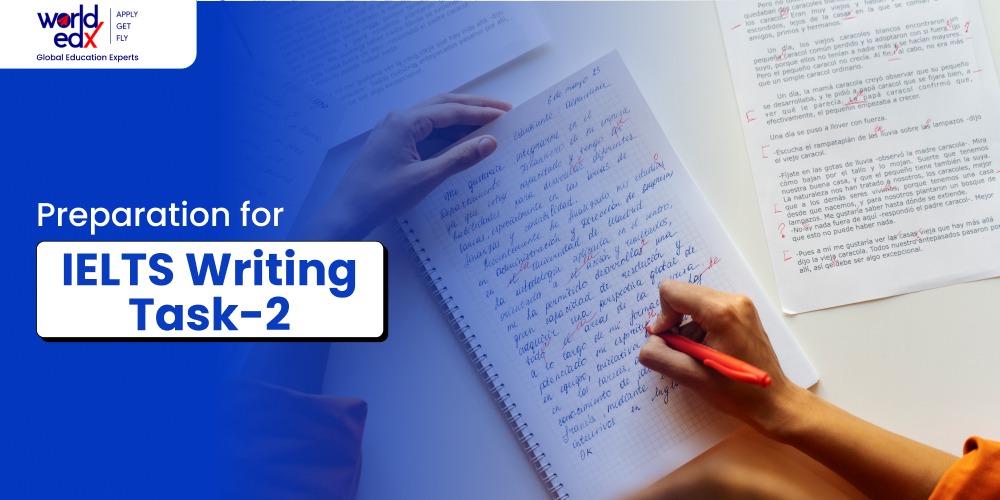The IELTS Writing Task 2 essay is a critical component of the IELTS exam, demanding language proficiency and the ability to analyse, argue and express ideas coherently. In this comprehensive guide, we will dive into the complete details of preparing an impressive essay, exploring each crucial element that contributes to a high-scoring response.
What is IELTS Writing Task 2?
The IELTS Task 2 is the second part of the Writing section in the International English Language Testing System (IELTS) exam. It is an essay-writing task that assesses your ability to present a well-structured argument or discuss a given topic clearly and effectively in English. The essay generally presents a problem or an issue and asks the test taker to express and support an opinion on the topic.
Key Elements of IELTS Task 2
The IELTS Writing Task 2 has the following key elements to consider:
- Essay Type: Task 2 is always an essay and the essay can be either argumentative, analytical or problem-solving in nature.
- Word Count: Test takers are expected to write at least 250 words. Going below this word limit may result in a lower score.
- Time Limit: Candidates have 40 minutes to complete Task 2. This task carries more weight than Task 1 in terms of scoring.
- Assessment Criteria: Task 2 is assessed based on several criteria, including task response (how well the candidate addresses the question), coherence and cohesion, lexical resource (vocabulary range and accuracy), grammatical range and accuracy and overall writing skills.
- Formal Style: The essay should be written in a formal style and candidates are expected to demonstrate their ability to organize ideas, use varied sentence structures and present a coherent and cohesive argument.
Format of IELTS Writing Task 2 Essay
Preparing a well-structured IELTS Writing Task 2 essay is crucial for scoring high on this part of the exam. Here’s a concise format to follow:
1. Introduction (Approximately 40-50 words):
- Paraphrase the Question: Begin by paraphrasing the essay question to demonstrate your understanding of the topic.
- Thesis Statement: Make your main argument on the matter very clear.
2. Background (Optional – Approximately 20-30 words):
Provide a brief background or context to the topic if the question requires it. This step is not always necessary, so check the question carefully.
3. Main Body Paragraphs (2-3 paragraphs):
- Topic Sentence (Approximately 10-15 words): Start each paragraph with a clear topic sentence that introduces the main point of the paragraph.
- Supporting Points (Approximately 50-70 words per paragraph): Provide 2-3 supporting points or examples for each topic sentence. Use specific examples, data or real-life situations to illustrate your points.
- Explanation/Analysis (Approximately 30-40 words per point): Analyze and explain how your examples support your thesis. Connect your ideas logically.
4. Counter-argument (Optional – Approximately 40-50 words):
Consider including a paragraph that acknowledges and counters opposing viewpoints. This adds depth to your essay and shows your ability to consider multiple perspectives.
5. Conclusion (Approximately 40-50 words):
- Summarize Main Points: Summarize the main points made in your essay without introducing new information.
- Restate Thesis: Restate your thesis differently, emphasizing the importance of your position.
- Closing Statement: Give the reader a lasting impression by finishing with an impressive sentence.
Remember that the key to a successful IELTS Writing Task 2 essay is clarity, coherence and relevance to the question. Practice writing essays on various topics to enhance your skills and develop a strong command of the essay format.

Strategies to Score High in IELTS Writing Task 2 Essay
Some of the most essential strategies which can be adapted by the test takers while attempting the second part of the Writing Section. Read the below-mentioned strategies to get a high score on this challenging section of the test:
Understanding the Question
It’s important to have a solid understanding of the question before composing an excellent IELTS Writing Task 2 essay. Carefully read and analyse the prompt, identifying the key components, such as the topic, specific instructions and any required information. To ensure that your response is relevant and focused, make sure you understand every aspect of the topic.
Planning Your Essay
Effective planning is the foundation of a well-structured essay. Allocate a few minutes at the beginning to brainstorm ideas and create a rough outline. Identify the key points you want to address in each paragraph, ensuring a logical flow from the introduction to the conclusion. This not only organizes your thoughts but also helps you stay on track during the writing process.
Support Your Ideas with Examples
An impactful essay is built on a foundation of solid examples. Support your arguments with real-life situations, statistics or personal experiences. Real examples not only validate your claims but also make your essay more engaging and convincing to the reader. Make sure the examples you provide to support your ideas are relevant to the topic.
Organize Paragraph Structure
Divide your essay into well-organized paragraphs, each serving a specific purpose. Start each paragraph with a clear topic sentence that contains the main idea. Follow it with supporting details and a concluding sentence to enhance coherence. Aim for a balanced distribution of information, avoiding excessively long or short paragraphs. This structure contributes to the clarity and readability of your essay.
Use Cohesion and Coherence
Cohesion refers to the logical connection between sentences and paragraphs, while coherence ensures a smooth flow of ideas. Achieve cohesion by using transitional words and phrases to link different parts of your essay. Consider the overall narrative structure, ensuring that each paragraph logically follows the preceding one. A well-cohesive and coherent essay is not only easier to read but also reflects a reliable and organized thought process.
Talk to an Expert for FREE Counselling
Use Proper Grammar and Punctuation
Grammatical accuracy and proper punctuation are mandatory for achieving a high band score. Pay meticulous attention to subject-verb agreement, tenses and sentence structure. Eliminate spelling errors and punctuate your sentences accurately. An excellent command of grammar and punctuation enhances the clarity of your communication and contributes to a positive overall impression.
Managing Time Effectively
Effective time management is a crucial aspect of the IELTS Writing Task 2. Allocate specific timeframes for each section of the essay-writing process, including understanding the question, planning, writing and reviewing. Be mindful of the time without compromising the quality of your content. Practice writing under timed conditions to enhance your time-management skills.
Use a Diverse Vocabulary
Impressive vocabulary is a powerful tool in showcasing your language proficiency. Avoid repetition and explore synonyms to express your ideas with precision. Strive for a balance between simplicity and complexity, adapting your language to the demands of the topic. Using diverse vocabulary not only enhances the quality of your writing but also showcases your language proficiency to the examiner.
In conclusion, the art of preparing an impressive IELTS Writing Task 2 essay involves a multi-faceted approach. By understanding the question, planning meticulously, using a diverse vocabulary, supporting ideas with examples, structuring paragraphs effectively, ensuring cohesion and coherence, perfecting grammar and punctuation and managing time efficiently, you can upgrade your essay to an exceptional standard. Continuous practice and improvement of these skills will undoubtedly contribute to your success in the IELTS examination.







